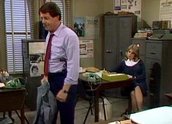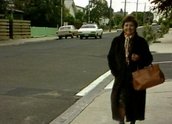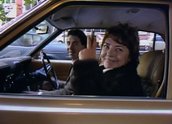


Cop Shop – Episode 485 (1983)
Synopsis
When a homeless man dies of natural causes in a laneway, it seems like an open-and-shut case. Henry Adam (Ted Ogden) was apparently penniless, leaving behind only a common-law wife, Faith Bloomfield (Elaine Lee). Then his nephew shows up. Law student Neville Adam (Christopher Bailey) claims his uncle left behind a large sum of money to which he is entitled – and that Faith has taken it. The Riverside police doubt his claims – that is, until reports of a scruffily dressed woman spending large sums of money around town start trickling in. Reluctantly, Detectives Tom Shannon (John McTernan) and ‘JJ’ Jeffrey Johnson (Peter Adams) investigate.
Meanwhile, Inspector Timms (John Lee) wants Amanda King (Lynda Stoner) to go undercover on a dangerous job involving drug syndicates – and her colleague and boyfriend JJ doesn’t like it. Policewoman Joyce Stratton (Billie Hammerberg) decides to apply for a new, high-powered job but also finds her colleagues don’t greet the idea with as much enthusiasm as she would like.
Curator’s notes
Guest performances can make a world of difference to the strength of an episode in series television. Here Elaine Lee, known for her role in Number 96 (1972–77), shines in a lively performance as a feisty homeless woman prone to bursting into musical theatre numbers. Christopher Bailey also entertains as the priggish law student.
At this point in its run Cop Shop demonstrates some relatively adventurous single-episode storylines, alongside its usual multi-episode crime plots and soap-oriented, open-ended relationship stories. In this episode, written by Vincent Gil, the playful single-episode storyline starring Lee steals the show. The story of Amanda going undercover continues into the next episode, where it is again outshone by a humorous strand (this time about a debonair cat burglar who courts Detective O’Reilly’s girlfriend.)
In both cases, the viewer is invited to like the eccentric 'criminal’ in question. In this episode, the police also clearly want to take the side of Lee’s Faith. Comic tension is generated between their obligation to do their job and their obvious desire to see Faith get away with her crime.
The undercover storyline, on the other hand, generates dramatic tension over a common Cop Shop concern: the status of women in families, relationships and the workplace. During Cop Shop’s 1977–84 run these were hot topics in the wake of second-wave feminism and campaigns for women’s rights. Nonetheless, the anxieties demonstrated by popular larrikin character JJ remain remarkably consistent throughout the series. His attitudes now look dated. The same theme is visible in a story strand about Joyce applying for a new, leadership role in another squad and her colleagues’ lukewarm reaction.
- Overview
- Curator’s notes
- Video 3 clips
- Principal credits
- Find a copy
- Make a comment
- Add your review



